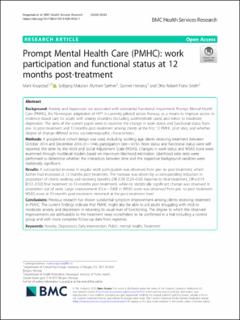| dc.contributor.author | Knapstad, Marit | |
| dc.contributor.author | Sæther, Solbjørg Makalani Myrtveit | |
| dc.contributor.author | Hensing, Gunnel | |
| dc.contributor.author | Smith, Otto Robert Frans | |
| dc.date.accessioned | 2021-04-06T18:42:15Z | |
| dc.date.available | 2021-04-06T18:42:15Z | |
| dc.date.created | 2020-03-20T15:07:08Z | |
| dc.date.issued | 2020 | |
| dc.Published | BMC Health Services Research. 2020, 20 . | |
| dc.identifier.issn | 1472-6963 | |
| dc.identifier.uri | https://hdl.handle.net/11250/2736452 | |
| dc.description.abstract | Background
Anxiety and depression are associated with substantial functional impairment. Prompt Mental Health Care (PMHC), the Norwegian adaptation of IAPT is currently piloted across Norway, as a means to improve access to evidence-based care for adults with anxiety disorders (including subthreshold cases) and minor to moderate depression. The aims of the current paper were to examine the change in work status and functional status from pre- to post-treatment and 12 months post-treatment among clients at the first 12 PMHC pilot sites, and whether degree of change differed across sociodemographic characteristics.
Methods
A prospective cohort design was used, including working age clients receiving treatment between October 2014 and December 2016 (n = 1446, participation rate = 61%). Work status and functional status were self-reported, the latter by the Work and Social Adjustment Scale (WSAS). Changes in work status and WSAS score were examined through multilevel models based on maximum likelihood estimation. Likelihood ratio tests were performed to determine whether the interaction between time and the respective background variables were statistically significant.
Results
A substantial increase in regular work participation was observed from pre- to post-treatment, which further had increased at 12 months post-treatment. The increase was driven by a corresponding reduction in proportion of clients working and receiving benefits (OR 0.38 [0.29–0.50] baseline to final treatment, OR = 0.19 [0.12–0.32] final treatment to 12-months post-treatment), while no statistically significant change was observed in proportion out of work. Large improvement (ES = − 0.89) in WSAS score was observed from pre- to post treatment. WSAS score at 12 months post-treatment remained at the post-treatment level.
Conclusions
Previous research has shown substantial symptom improvement among clients receiving treatment in PMHC. The current findings indicate that PMHC might also be able to aid adults struggling with mild to moderate anxiety and depression in returning to usual level of functioning. The degree to which the observed improvements are attributable to the treatment need nonetheless to be confirmed in a trial including a control group and with more complete follow-up data from registries. | en_US |
| dc.language.iso | eng | en_US |
| dc.publisher | BMC | en_US |
| dc.rights | Navngivelse 4.0 Internasjonal | * |
| dc.rights.uri | http://creativecommons.org/licenses/by/4.0/deed.no | * |
| dc.title | Prompt Mental Health Care (PMHC): work participation and functional status at 12 months post-treatment | en_US |
| dc.type | Journal article | en_US |
| dc.type | Peer reviewed | en_US |
| dc.description.version | publishedVersion | en_US |
| dc.rights.holder | Copyright 2020 The Author(s). | en_US |
| dc.source.articlenumber | 85 | en_US |
| cristin.ispublished | true | |
| cristin.fulltext | original | |
| cristin.qualitycode | 2 | |
| dc.identifier.doi | 10.1186/s12913-020-4932-1 | |
| dc.identifier.cristin | 1802695 | |
| dc.source.journal | BMC Health Services Research | en_US |
| dc.source.40 | 20 | |
| dc.identifier.citation | BMC Health Services Research. 2020, 20, 85 | en_US |
| dc.source.volume | 20 | en_US |

